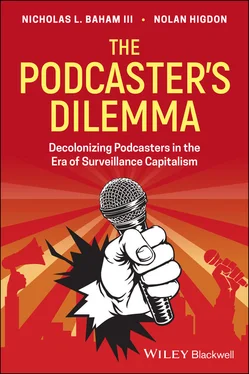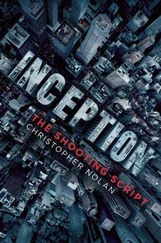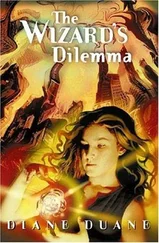15 15 Susan Douglas, Inventing American Broadcasting: 1899–1922 (Baltimore, MD: John Hopkins University Press, 1987); Michelle Hilmes, Radio Voices: American Broadcasting, 1922–1952 (Minneapolis: University of Minnesota Press, 1997).
16 16 Gretchen King, “History of Struggle: The Global Story of Community Broadcasting Practices, or a Brief History of Community Radio,” Westminster Papers in Communication and Culture 12.2 (2017): 18–36, here p. 21. DOI: http://doi.org/10.16997/wpcc.227.
17 17 Ibid. p. 22.
18 18 Ibid. p. 23.
19 19 Ibid., p. 25.
20 20 Ibid.
21 21 Ibid. pp. 26–27.
22 22 Ibid., p. 29.
23 23 Tiziano Bonini, “Twitter or Radio Revolutions? The Central Role of Açık Radyo in the Gezi Protests of 2013,” Westminster Papers in Communication and Culture 12.2 (2017): 1–17, here p. 1. DOI: http://doi.org/10.16997/wpcc.232.
24 24 Andrew J. Bottomley, Sound Streams: A Cultural History of Radio–Internet Convergence (Ann Arbor: University of Michigan Press, 2020).
25 25 Ibid., pp. 102–103.
26 26 Ibid.
27 27 Markus Lundström and Tomas Poletti Lundström, “Podcast Ethnography,” International Journal of Social Research Methodology, 24.3 (2020): 1–11; Reza Lotfian and Carlos Busso, “Building Naturalistic Emotionally Balanced Speech Corpus by Retrieving Emotional Speech from Existing Podcast Recordings,” IEEE Transactions on Affective Computing (2017): 1–14; Dario Llinares, Neil Fox, and Richard Berry, eds., Podcasting: New Aural Cultures and Digital Media (Cham: Palgrave Macmillan, 2018); Martin Spinelli and Lance Dann, Podcasting: The Audio Media Revolution (New York: Bloomsbury Publishing USA, 2019).
28 28 Ibid; Stuart Hall, Dorothy Hobson, Andrew Lowe, and Paul Willis, eds., Culture, Media, Language: Working Papers in Cultural Studies, 1972–79 (New York: Routledge, 2003).
29 29 Chantal J. Zabus, The African Palimpsest: Indigenization of Language in the West African Europhone Novel (New York: Rodopi, 2007), p. 2.
30 30 Last Moyo, The Decolonial Turn in Media Studies in Africa and the Global South (Cham: Palgrave Macmillan, 2020), p. 113.
31 31 Glen S. Coulthard, “Subjects of Empire: Indigenous Peoples and the ‘Politics of Recognition’ in Canada,” Contemporary Political Theory 6.4 (2007): 437–460; Eve Tuck and K. Wayne Yang, “Decolonization Is not a Metaphor,” Decolonization: Indigeneity, Education & Society 1.1 (2012): 1–40.
32 32 Tuck and Yang, “Decolonization Is not a Metaphor,” p. 2.
33 33 Ibid.
34 34 Vera Nünning and Ansgar Nünning, “Fictions of Empire and the (Un-)Making of Imperialist Mentalities: Colonial Discourse and Post-colonial Criticism Revisited,” Foreign Literature Studies 37.4 (2015): 22–38.
35 35 Eric John Ramos David and Sumie Okazaki, “Activation and Automaticity of Colonial Mentality,” Journal of Applied Social Psychology 40.4 (2010): 850–887.
36 36 Shawn O. Utsey, Jasmine A. Abrams, Annabella Opare-Henaku, Mark A. Bolden, and Otis Williams III, “Assessing the Psychological Consequences of Internalized Colonialism on the Psychological Well-Being of Young Adults in Ghana,” Journal of Black Psychology 41.3 (2015): 195–220; Anand C. Paranjpe, “Indigenous Psychology in the Post-colonial Context: An Historical Perspective,” Psychology and Developing Societies 14.1 (2002): 27–43.
37 37 Reiland Rabaka, Forms of Fanonism: Frantz Fanon’s Critical Theory and the Dialectics of Decolonization (Lanham, MD: Lexington Books, 2010); Antonio Gramsci, Prison Notebooks, edited by Joseph A. Buttigieg (New York: Columbia University Press, 1992); Nünning and Nünning, “Fictions of Empire”.
38 38 Antonia Darder, “Decolonizing Interpretive Research: A Critical Bicultural Methodology for Social Change,” International Education Journal: Comparative Perspectives 14.2 (2015): 63–77.
39 39 Darder, “Decolonizing Interpretive Research,” p. 65.
40 40 Ibid.
41 41 Stephen Soldz, Jean Maria Arrigo, and Ray Bennett, “Interrogation, Psychology and,” in The Encyclopedia of Peace Psychology (2011), edited by Daniel Christie, vol. 2 (Oxford: Wiley Blackwell, 2011): 577–582.
42 42 Sarah De Leeuw and Sarah Hunt, “Unsettling Decolonizing Geographies,” Geography Compass 12.7 (2018): e12376.
43 43 Sonya Andermahr, “Decolonizing Trauma Studies: Trauma and Postcolonialism: Introduction,” Humanities 4 (2015): 503–505.
44 44 Darder, “Decolonizing Interpretive Research,” p. 68.
45 45 Ibid., p. 92.
46 46 Hilde Lindemann Nelson, Damaged Identities, Narrative Repair (Ithaca, NY: Cornell University Press, 2001), p. 6.
47 47 Darder, “Decolonizing Interpretive Research,” p. 68.
48 48 Poke Laenui, “Process of Decolonization,” in Reclaiming Indigenous Voice and Vision, edited by Marie Battiste (Vancouver: UBC Press, 2000), 150–160.
49 49 Sandeep Banerjee, Space, Utopia and Indian Decolonization: Literary Pre-figurations of the Postcolony (New York: Routledge, 2019).
50 50 Jacqueline Dutton, “Flipping the script on Africa’s Future in the United States of Africa by Abdourahman A. Waberi,” Spaces of Utopia: An Electronic Journal (2nd series) 1 (2012): 34–55.
51 51 Michael Kelly, ed., Critique and Power: Recasting the Foucault/Habermas Debate (Cambridge, MA: MIT University Press, 1994); Max Horkheimer, Critical Theory Selected Essays (New York: Continuum, 1982); Paul Piccone, The Essential Frankfurt School Reader (New York: Continuum, 1978); Paul Heyer, Communications and History: Theories of Media, Knowledge, and Civilization (New York: Greenwood Press, 1988); Graeme Patterson, History and Communications: Harold Innis, Marshall McLuhan, and the Interpretation of History (Toronto: University of Toronto Press, 1990); Judith Stamps, Unthinking Modernity: Innis, McLuhan, and the Frankfurt School (Montreal: McGill-Queens University Press, 2001).
52 52 Brenda Allen, Difference Matters: Communicating Social Identity (Long Grove, IL: Waveland Press, 2010); Nünning and Nünning, “Fictions of Empire”.
53 53 Juanita Darling, “Radio and Revolution in El Salvador: Building a Community of Listeners in the Midst of the Civil War, 1981–1992,” American Journalism 24.4 (2007): 67–93, here p. 68; Gretchen King, “History of Struggle: The Global Story of Community Broadcasting Practices, or a Brief History of Community Radio,” Westminster Papers in Communication and Culture 12.2 (2017): 18–36. DOI: http://doi.org/10.16997/wpcc.227.
54 54 Tiziano Bonini, “Twitter or Radio Revolutions? The Central Role of Açık Radyo in the Gezi Protests of 2013,” Westminster Papers in Communication and Culture 12.2 (2017): 1–17, here p. 11. DOI: http://doi.org/10.16997/wpcc.232.
55 55 Ibid. p. 2.
Конец ознакомительного фрагмента.
Текст предоставлен ООО «ЛитРес».
Прочитайте эту книгу целиком, купив полную легальную версию на ЛитРес.
Читать дальше












